Stop Blaming Trans Activism for the Overturning of Roe v Wade
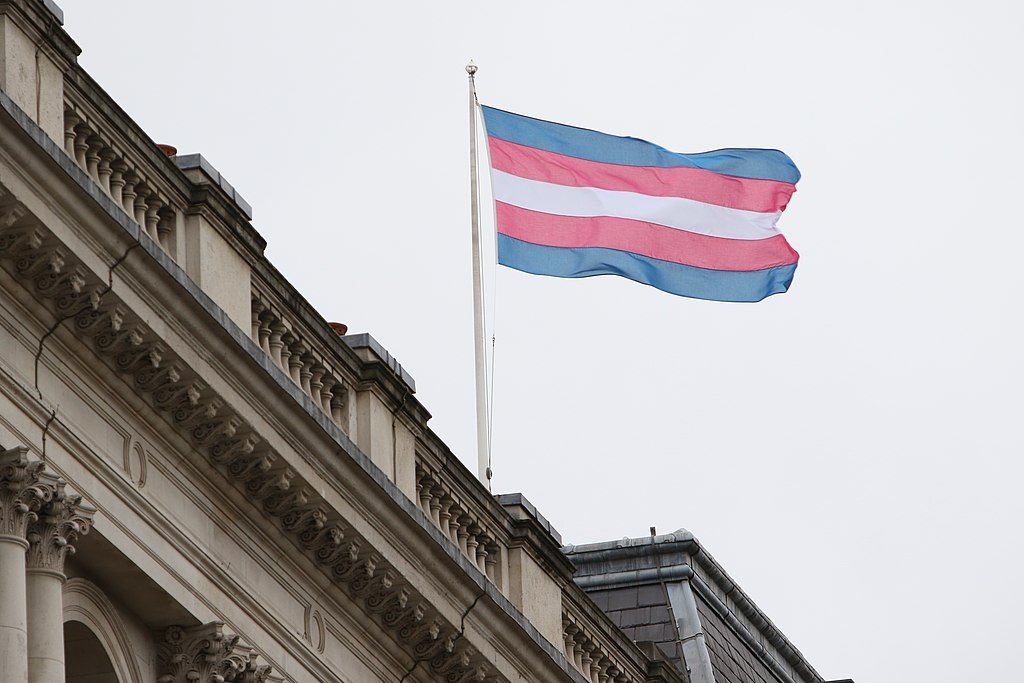
I am all done having babies.
I’ve got a toddler and a baby. They are the cutest, best, smartest and most charming children in the history of the world; this is indisputable fact. Who is to say how it came to be that I am the person who got to have the most wonderful and adorable children ever? Fate is as capricious as a cool breeze on a spring day, and these are just the cards I was dealt.
But I’m not doing it again. I knew when I got married that I wanted two and that’s all. So did my spouse. I was willing to go through the pain and discomfort, pay thousands of dollars for healthcare (with insurance), and risk complications and even death, but only twice. That’s the deal. You’re not getting any more out of me.
Everyone has their number. For me, it was two. For some people, it’s zero. The number of fetuses you host in your body is a monumental decision that will have lasting effects on your health and your life, regardless of whether the resulting baby stays in your custody. During the Supreme Court hearing on whether to overturn Roe v. Wade, Amy Coney Barrett made the argument that forced birth is not an undue burden, a stance that, coming as it did from a person who has carried five fetuses to term, beggars belief. My friends who have had babies in the last couple of years are incredulous: one who is pregnant with her second child exclaimed, “Pregnancy is torture even if you want it.” Abortion is medically safer than giving birth, and even in a picture-perfect pregnancy, a person’s body will change drastically and they will experience symptoms such as nausea, fatigue, and pain that will impact their quality of life. Maybe they won’t be so lucky and they will be one of the millions of people with complications like hyperemesis gravidarum or gestational diabetes. Then they’ll go through either labor that lasts for days and often results in perineal tearing, a surgery that severs all the muscles in their abdomen, or a combination of both. At this point they’ll need to stay in a hospital bed for a few more days before they’re allowed to leave. Once they’re out, the very best they can hope for is that recovery is wrapped up in six months. That is, unless you count urinary incontinence, which affects a large percentage of people for much longer. I would love to hear Justice Coney Barrett explain how that isn’t an undue burden.
According to the leaked draft of the SCOTUS decision, Alito’s opinion is that pregnancy is no longer a burden for several reasons. Alito claims that attitudes about unmarried moms have improved “drastically,” (not as much as he’d like to think), discrimination on the basis of pregnancy is illegal (it still happens all the time), leave for pregnancy and childbirth are guaranteed by law “in many cases” (the United States is an international embarrassment on that front), that insurance or the government cover the costs of medical care (oh my God), that safe haven laws “generally” allow people to drop babies off anonymously (the word “generally” here is carrying a lot of weight), and that someone putting a baby up for adoption “has little reason to fear that the baby will not find a suitable home” (a complicated question whose answer is often less than reassuring).
Now, even if all of that were true (and it’s not), none of it addresses the physical and emotional burden of bringing a pregnancy to term, the effects of which can last anywhere from a year and a half to the rest of your life. For multiple moral, historical, and medical reasons, access to abortion remains as crucial to maintain as ever.
Roe v. Wade argued thatabortion was protected under the right to privacy within the Fourteenth Amendment, which ensures that decisions relating to a person’s private life cannot be constrained by legislation as long as they do not conflict with another’s rights. This guarantee, now about to be weakened, protected not only abortion but also intimacy and marriage between people of the same sex, and full participation of trans people in society. The fight for one should be understood as the fight for all of them, and the considerable amount of political and social energy being devoted to pitting them against each other is damaging to our cause.
LGBTQ+ rights and reproductive justice: No conflict

There is a group of people who consider themselves to be feminists, and who feel they have located the reason why this attack on reproductive rights has been successful: cultural acceptance of trans, nonbinary, agender, and gender-nonconforming identities. These people often call themselves “gender-critical feminists.” Their position is that sex and gender are completely separate things: sex is a material, binary, and immutable quality of all humans, and gender is an illusion made entirely of harmful stereotypes. They argue that women’s spaces like bathrooms, changing rooms, and sports teams should be restricted to cisgender women because they either don’t think there is enough evidence that trans women won’t commit violence just as readily as men, or they think it’s a fact that they do. This is a myth.
In 2018, journalist Sarah Ditum wrote for the Economist that inclusive language like that used in a cancer charity’s tweet aimed at “everyone aged 25-64 with a cervix” actually contributed to the erosion of women’s rights. Philosophy associate professor Holly Lawford-Smith created a website called “No Conflict, They Said” in which she solicited anecdotes from people about ways they felt trans rights and trans acceptance were hurting women. Notably, these anecdotes largely consisted of things like people seeing someone they thought might be trans and becoming afraid, going into an area marked for women’s use and remembering that trans women could theoretically use the same area, or even seeing a cis man—not a trans woman—in the vicinity of a women’s area (but not actually inside it).
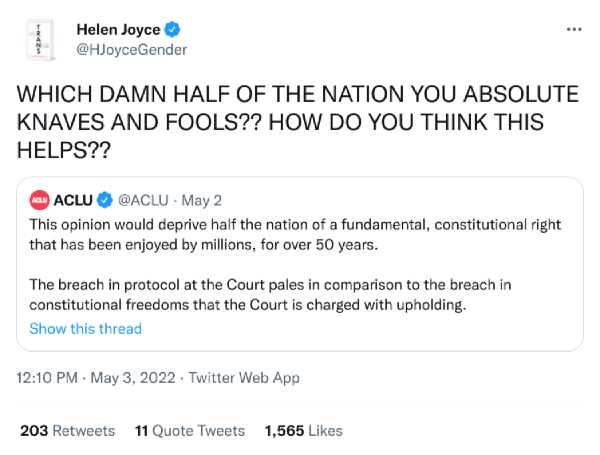
This group of people have reacted to the news of Roe v. Wade’s imminent destruction by suggesting that it was made possible because reproductive rights advocates were hamstrung by an inability to define their needs as specific to women. They feel that phrases like “pregnant people” or “people with a cervix” are a direct attack on women’s rights, which they term “sex-based rights.” According to gender-critical ideology, everyone with a cervix is biologically female, and therefore the use of words like “people” or “bodies” erases the status of women and actually prevents effective advocacy on their behalf.
In an op-ed for UnHerd, gender critical feminist Julie Bindel blames the success of anti-feminist policies on a growing acceptance that biological sex is neither binary nor immutable. She writes, “When these groups deny the reality and significance of biological sex, it’s no wonder that issues such as abortion rights go down the pan.” In a different op-ed for UnHerd, journalist Hadley Freeman writes, “The right to abortion is specifically about who has control over women’s bodies. How, though, can this be discussed, let alone defended, when too many liberal US politicians and liberal media sites can’t even bring themselves to say the word ‘woman’, even when covering this issue?” Journalist Megan McArdle has a piece in the Washington Post arguing the same thing. They are not alone among prominent anti-trans feminist figures.
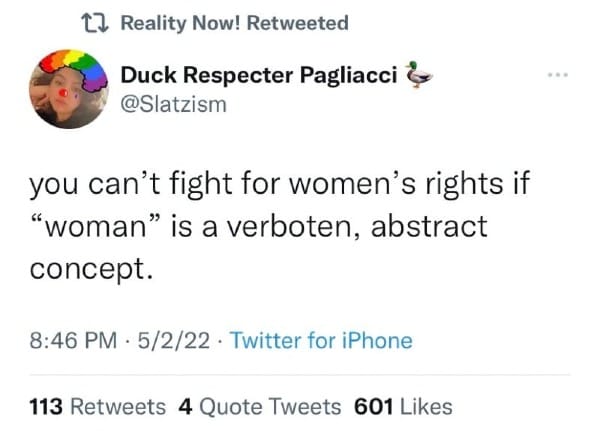
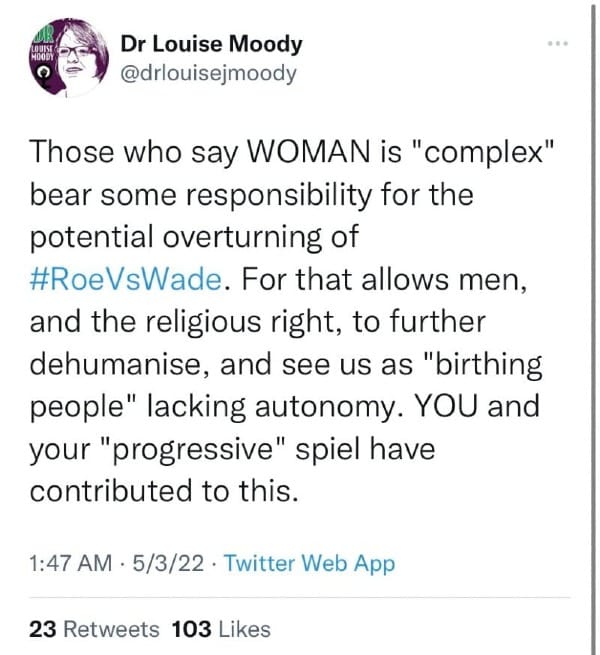
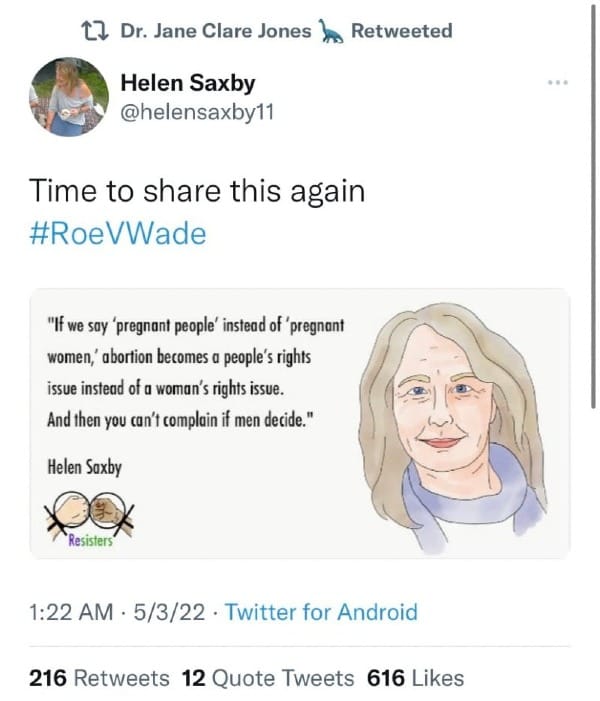
As a linguist, let me be clear: a cancer charity referring to “people with a cervix,” or a medical organization publishing information about “people who may become pregnant” is not erasing women, and it does not imperil our rights. To say “women” in those cases loses specificity by including women who were born without a cervix or had it removed, or women who cannot become pregnant, and it excludes relevant people such as trans men and nonbinary people who fit that description. Furthermore, nobody with any power is insisting that the word “woman” be erased from discussions about reproductive justice. The Trans Journalists Association specifically advises that there are times when doing so is counterproductive. Referring to “birthing bodies” for example, is ill-advised and can be seen as dehumanizing, especially when “people” is right there. Its use by well-meaning people like Representative Francesca Hong creates situations where anti-trans activists can (rightly) object to a dehumanizing phrase and (wrongly) blame its existence—and trans acceptance by association—for the loss of reproductive rights.
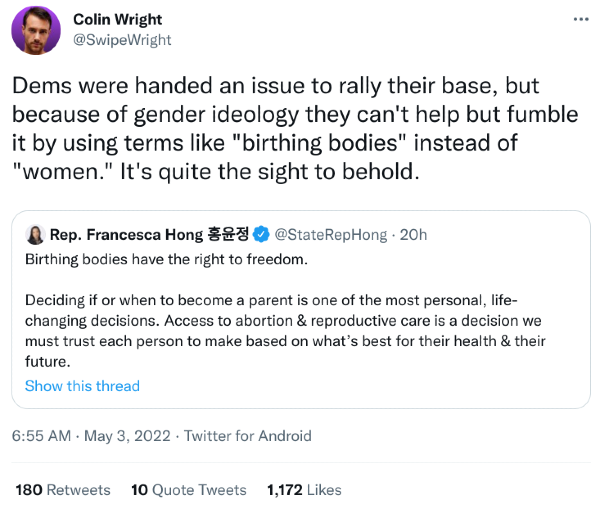
The belief in sex-based rights—women’s rights reconstrued as incompatible with trans ones—is based on several misunderstandings about the history of gender. Gender critical ideology holds that public bathrooms are sex-segregated because women wanted to be safe from men. The real reason women’s bathrooms were introduced was to prevent women from participating fully in public life by creating “a protective, home-like haven in the workplace for women” as consolation for society’s failure to force women to stay in the home. Gender critical feminists also seem to believe that sports are sex-segregated because women wanted to excel without being edged out by biologically superior men. In actuality, it was because women were prohibited from participating in formal, competitive sports and therefore had to create their own leagues in order to play at all. Certain academics still argue that having an M on your birth certificate creates an unfair advantage whether you transition or not, an idea that has been debunked.
Perhaps the argument that women’s rights are endangered by trans inclusion would hold more water if a politician in the UK who is celebrated as a “champion of women and children” by gender critical feminists hadn’t sponsored an anti-abortion bill there.
In the gender critical imagination, an acceptance of trans and non-binary identities weakens the claim women have to these so-called sex-based rights, including the right to abortion. But this is the result of their faulty framework, which requires them to see trans people’s right to autonomy as undesirable even though it rests on the same logic that underpins reproductive rights.
This contradiction leads to a situation in which these self-identifying feminists are producing arguments that are indistinguishable from those of people who work in opposition to feminism. Bret Weinstein is a former biology professor and current COVID-19 conspiracy theorist who likes to opine about what feminists get wrong. Despite his disagreements with feminism, his framing is still centered around protecting women’s sex-based rights. Cathy Young, who has taken distinctly anti-feminist positions on topics such as rape and Gamergate, takes the same tack.
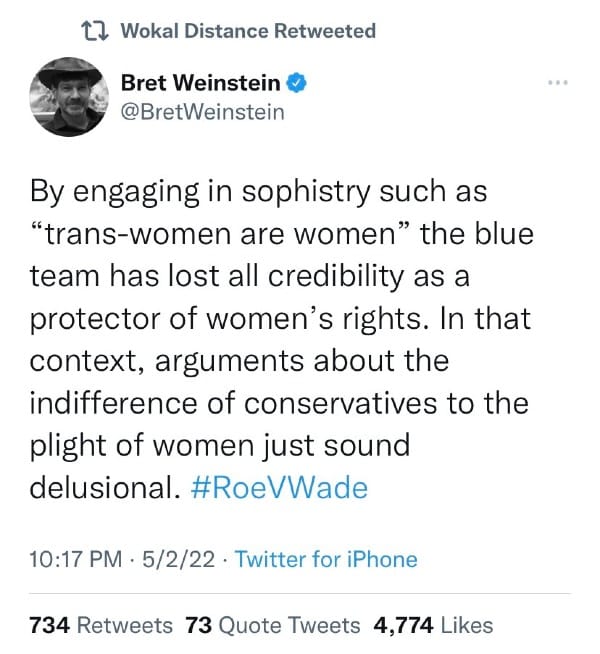

Extreme right wing commentators are using the exact same gender-essentialist arguments as they react to the SCOTUS decision. Figures like Liz Wheeler and Matt Walsh feel no need to defend Roe v. Wade, but they still maintain the throughline of decrying gender inclusivity.
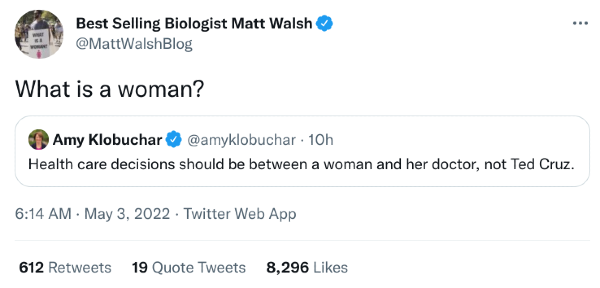
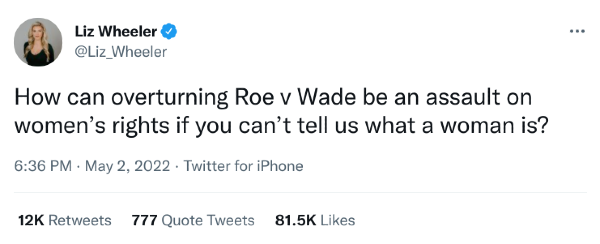
The anti-trans rhetoric of the gender critical feminists is reproduced in U.S. politics as well, mostly on the far right. During her confirmation hearing, Justice Ketanji Brown Jackson was badgered about the definition of “woman” by members of the GOP. Right-wing extremist Janet Porter, the architect of the Texas “heartbeat” bill, is using the momentum of the SCOTUS decision to pursue avenues by which anyone can sue teachers, librarians, or school board members for discussing LGBTQ+ topics with students. In fact, the same politicians who campaign on pro-life, “family values” platforms are also introducing bills that gender critical feminists want: preventing trans youth from accessing puberty blockers, excluding trans students from using the bathrooms and locker rooms that match their gender, and preventing them from participating in single-sex sports that match their gender. As if it weren’t clear enough, Republican representative Julianne Young said of a bill to deny medical care to trans people: “I see this conversation as an extension of the pro-life argument…. We are not talking about the life of the child, but we are talking about the potential to give life to another generation.”
Some anti-trans feminists express surprised concern that gender critical ideology has garnered support from the far right, while many others deny it outright:
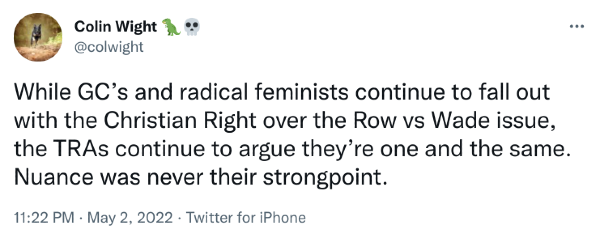

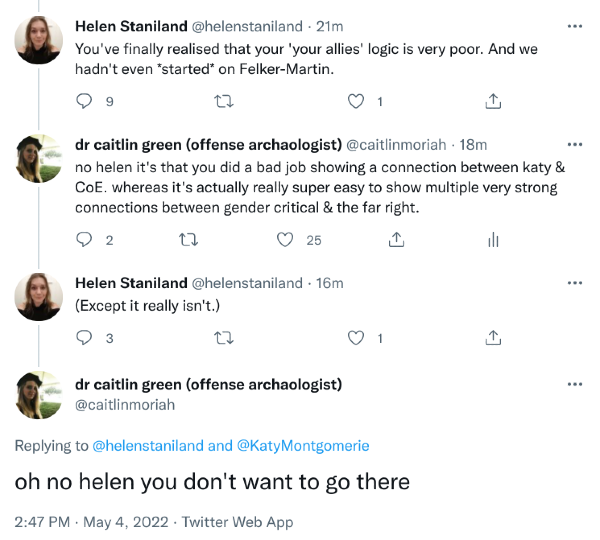
It is hard to believe that they might be unaware of the close relationship gender critical feminism has with the far right. A GOP senator recently used J.K. Rowling’s words to justify blocking a bill for LGBTQ+ rights. The Heritage Foundation hosted board members from the Women’s Liberation Front (WoLF) and have signed onto documents relating to gender identity, submitted to the UN, alongside multiple gender critical organizations. They have received funds from and worked closely with right-wing extremist groups the Alliance Defending Freedom and Imperial Independent Media. WoLF board member Kara Dansky has appeared several times on Tucker Carlson’s show, as have former Baltimore City LGBTQ Commision’s Law and Policy Committee member Julia Beck and Quillette’s Colin Wright. Wright is also known for talking to right-wing media to proclaim that he left academia because they would not accept his views on gender (no mention of his involvement in publishing fraudulent data). The very same week that Wright penned an article for Newsweek blaming trans acceptance for the loss of reproductive rights, he sat down for an interview with an extremist far-right election conspiracy theory site, the Epoch Times. This is far from an exhaustive list of the various ways gender critical feminists have worked with, bolstered, and relied on far right figures.
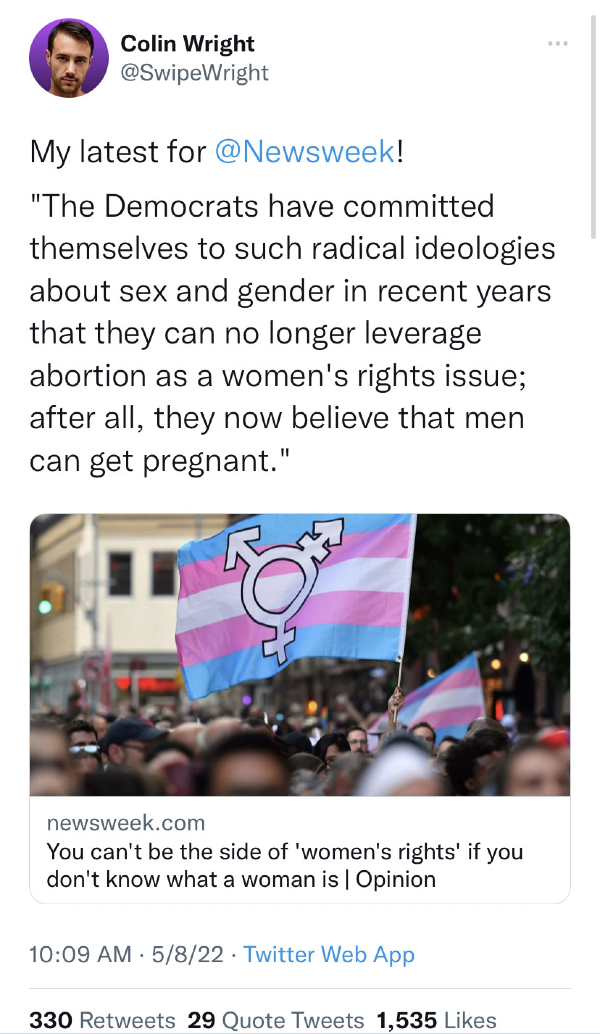
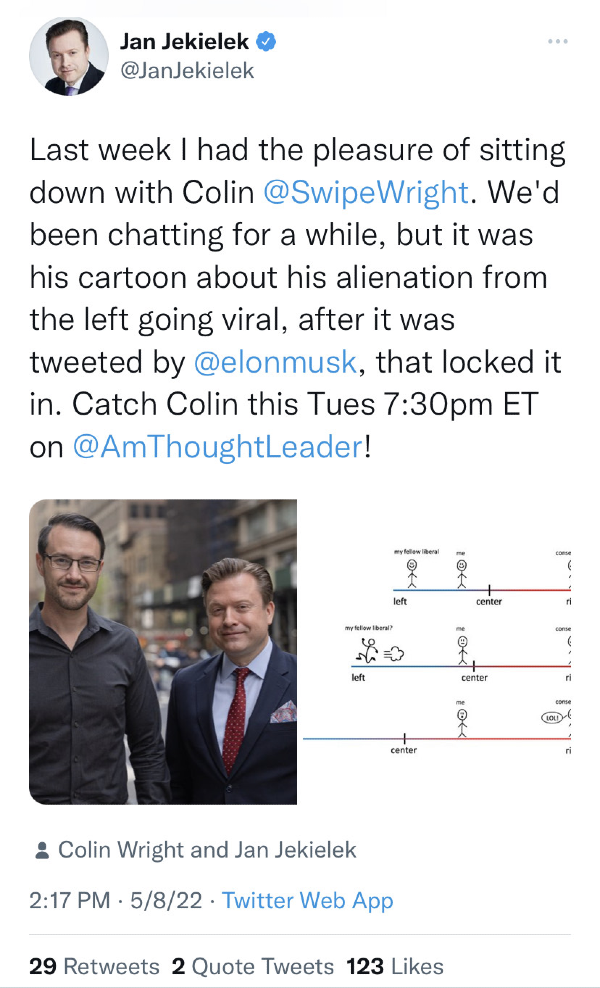
Gender critical feminists have found a receptive audience in the far right, perhaps because the two ideologies contain several themes in common.
The far right has embraced the practice of accusing teachers and others who work with children of being “groomers,” an extremely serious allegation. If you think someone is purposely training children to be receptive to sexual abuse, you might find it reasonable to lobby for their firing, encourage their prosecution, or even approve of violence against them. Ron DeSantis’s press secretary recently called his anti-LGBTQ+ bill “an Anti-Grooming Bill.” Libs of TikTok, a Twitter account that is frequently referenced by conservative media, routinely harasses and doxxes teachers on this basis.
Unfortunately, this theme is also present in gender critical circles. Abigail Shrier, author of the misleading book Irreversible Damage, considers her work to be feminist in that her stated goal is the protection of children she believes to be girls from the dangers of “gender ideology.” She has written extensively accusing teachers and teaching organizations of “recruiting” kids and “subverting parents, conservative communities and school principals on issues of gender identity and sexual orientation.” Conservative outlets have reproduced her claims that girls are being manipulated by teachers into changing their gender identities, creating an atmosphere of terror with quotes like this one for Fox News: "Parents can never underestimate the level of deception and manipulation that activist teachers are willing to go to on issues of gender.” Journalist Jesse Singal, who insists he is not anti-trans, denounces the right wing tendency to label people “groomers,” but his work has been instrumental in painting young trans boys and men as vulnerable little girls led astray by older people making false promises. Rather than fight the highly dangerous “groomer” narrative, some influential gender critical figures explicitly play into it while attacking accomplished advocates for LGBTQ+ rights.
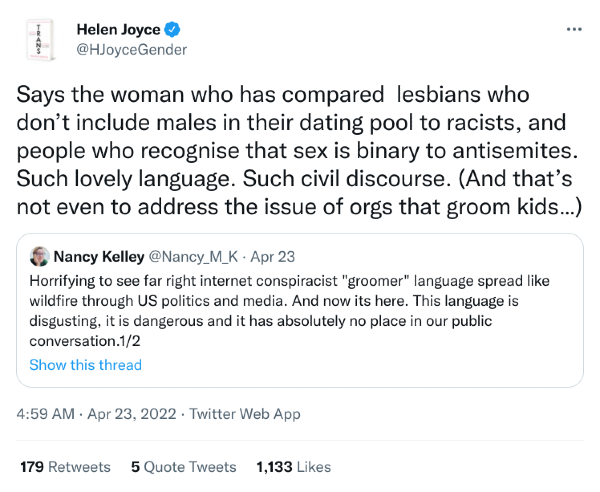
In some anti-trans feminist circles, an antisemitic conspiracy theory has taken hold which posits that trans acceptance is a plot by Jewish billionnaires to dissociate us from our bodies and cause us to accept a new social order that they will impose on us. This theory often gets sanitized so that mainstream figures can promote it without sounding quite so hateful. Philosopher Christa Peterson has demonstrated that it has become quite accepted by the majority of gender critical leaders. In an exchange that precipitated the most intense social media pile-on I have ever personally experienced, gender critical activist Jane Clare Jones challenged me to find any evidence that her work, which wildly overstates the role of Jewish trans woman Martine Rothblatt in trans history, was in any way informed by Jennifer Bilek’s conspiracy theories knowing full well she had previously directed her substantial following to her “thought provoking” work on just that subject. I am reminded of Sartre’s advice on anti-semites who “know that their remarks are frivolous, open to challenge. But they are amusing themselves, for it is their adversary who is obliged to use words responsibly, since he believes in words.” When it comes to playing with language, the far right has found a useful set of toys: feminist-sounding anti-trans rhetoric.
White supremacy, race suicide, and the domestic supply of infants
The impulse to constrain the definition of “woman” to a strictly delineated category with a simple definition is in no way empirical or universal: it comes from the logic of white supremacy and colonialism. In Ruby Hamad’s White Tears/Brown Scars, she describes the lasting impact of colonial ideologies that positioned non-white women and girls as not really women. Black, Indigenous, Asian, and Latina women were and are routinely portrayed as sexually insatiable and incapable of self-control, justifying centuries of unspeakable sexual and medical violence designed to prevent them from being in control of their own sexuality and fertility. Children were ripped from the arms of their mothers and handed to “real” mothers, childless married white women.
In the meantime, middle-class and wealthy white women were encouraged to procreate in order to secure the position of the white race. In 1902, Theodore Roosevelt, then president, wrote in a preface to the book The Woman who toils, “the man or woman who deliberately avoids marriage, and has a heart so cold as to know no passion and a brain so shallow and selfish as to dislike having children, is in effect a criminal against the race, and should be an object of contemptuous abhorrence by all healthy people." This was a reaction to fears of “race suicide,” a term devised by eugenicists to inspire fear that the white race would become extinct as they were oustripped in population by other, more sexually voracious races.
Proponents of eugenics relied on nostalgic descriptions of motherhood to center reproductive capacity as the defining feature of women. This way of thinking led directly to “family values” policies that placed the state in charge of people’s reproductive rights. And it wasn’t just Republicans who felt the state should be able to control the reproductive capacity of its residents. In 1974, responding to Roe v. Wade, Joe Biden told a reporter, “I don’t like the Supreme Court decision on abortion. I think it went too far. I don’t think that a woman has the sole right to say what should happen to her body. I support a limited amnesty.”
The allure of a slightly less-ornate throne just to the right of white men has long been too attractive for white femininity to pass up. Far from opponents of colonialism, white women were active participants in it. Analyses of their writings show how colonial women took on the subservient role assigned to them by white patriarchs in order to secure a position above the colonized. It is a pattern that has proved hard to shake. In 2016, 47 percent of white women voted for Donald Trump, the president who seated three of the five justices who will be voting to undo Roe v. Wade. White feminism is thought to be deeply inadequate for securing real liberation because of the tendency to uphold the power structures that only benefit white women; this pattern explains why gender critical feminism is such a strong force for oppression of LGBTQ+ people despite its ostensible focus on securing rights.
There were ways to reduce the power of Roe v. Wade by focusing on the 15-week line, which would have restricted the consequences of this decision to abortion only, but the draft decision doesn’t do that: it instead focuses on the claim that a right to have an abortion is guaranteed by our Fourteenth Amendment right to privacy. Alito makes vague promises not to go after other rights that hinge on that understanding of the 14th, but very concerningly only the ones that, according to Alito, have “deep roots” in American history. That leaves out rights like same-sex intimacy and marriage. It also makes it much harder to fight laws that criminalize certain forms of birth control or even miscarriages by requiring medical professionals to sell out their patients. Even IVF is not safe: Louisiana Republicans have just advanced a bill out of committee that would define destruction of a fertilized egg as a homicide. Like policies that make it harder to be LGBTQ+, policies that restrict abortion are designed to allow the state to control reproduction in order to ensure a higher “domestic supply of infants,” as Alito put it in his decision draft.
Like the gender critical notion of “sex-based rights,” this justification for eliminating the right to abortion is based on a serious ignorance of history. Abortions were common and legal before 1880, making them a practice with deep roots, contrary to Alito’s claim.
The framing of women’s rights as at odds with LGBTQ+ rights, particularly trans rights, represents a fundamental failure of trans-exlusive feminism to reckon with our history, and we continue to engage in it at our peril. The far right will continue to use the same logic they just used to attack reproductive rights to undermine the other rights that the overturned laws were understood to protect. Any feminist who provides cover for their homophobic and transphobic activities, or who diverts blame to gender diversity, is complicit in the dismantling of our rights.
In the meantime, prominent trans journalists and activists have spent their time objecting to this loss and disseminating useful information.
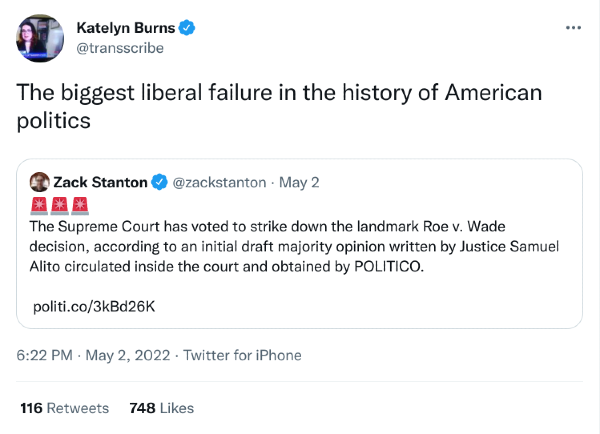
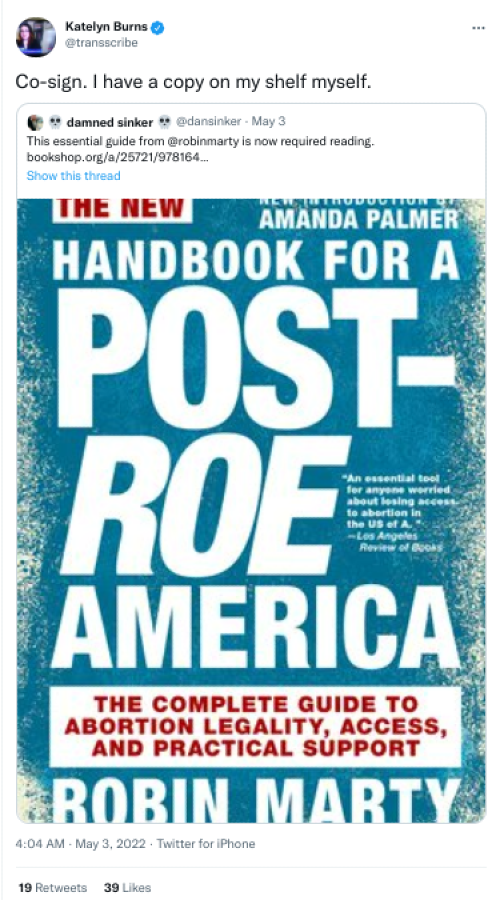
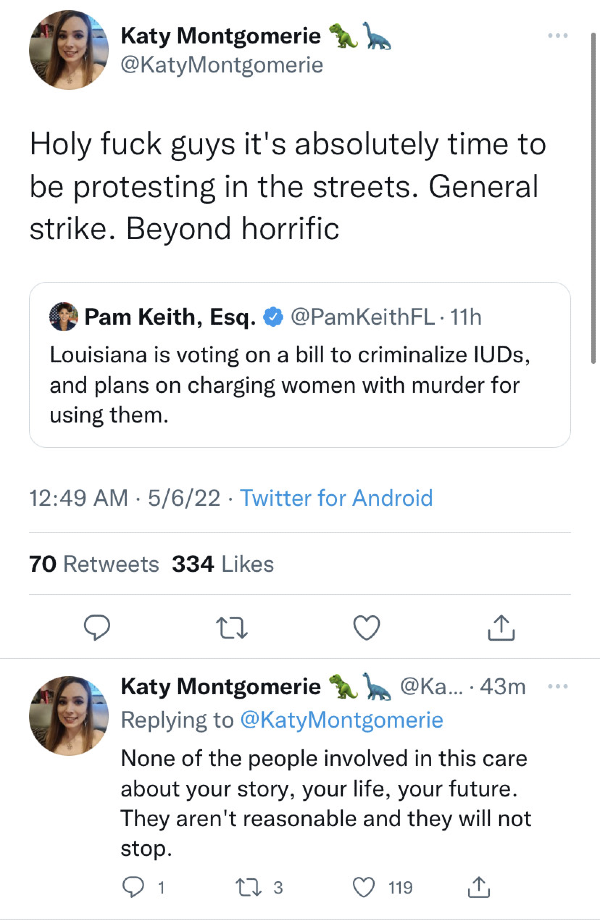
Why are LGBTQ+ advocates so often active and effective participants in the fight for reproductive justice? It’s not just that cisgender lesbian/bisexual/pansexual/asexual women exist, as do trans men, as do nonbinary people with wombs, all of whom have a personal interest in protecting their own right to an abortion. It’s not just that everyone is impacted by pregnancy and birth, be it the person who is pregnant or the people who love and depend on them. While both are true, it’s also that LGBTQ+ people throughout history have understood a fact that more cisgender straight women need to learn: all of our rights are underpinned by the same moral truths, and they are under attack by the same methods. This is a fight for our lives, and we need each other.
Featured Image is Transgender Pride Flag.




